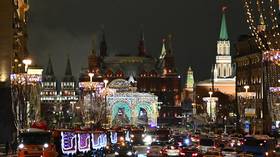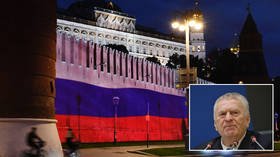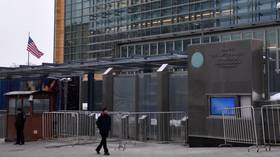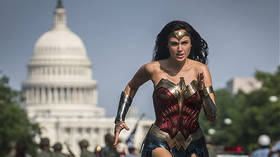So long, 2020: Another year passes & despite Western predictions, warnings & wishful thinking, Russia fails to collapse... again

Russia is often portrayed as a giant with feet of clay. If pushed hard enough, the assumption is that it will collapse. Yet, the experience of 2020 suggests that its foundations are stronger than many people imagine.
The Russian capacity for hardship is legendary. So too is the country’s ability to deal with, and overcome, adversity. From the Time of Troubles through the revolutions of 1917, the Civil War, Stalinist repression, the Second World War, the collapse of communism, and the economic and social travails of the 1990s, Russia has displayed a remarkable resilience.
“We cannot escape suffering,” wrote the Russian philosopher Ivan Ilyin, once upon a time; “it is our fate and we must come to terms with it.”
Also on rt.com Russia reveals it has world’s 3rd-highest overall Covid-19 deaths after US & Brazil, per capita numbers similar to rest of EuropeThe year 2020 has been no exception. Covid-19, economic recession, internal protests, international sanctions, and war and revolution on the country’s periphery have combined to give Russia its own version of what Britain’s Queen Elizabeth II in a different context called an “annus horribilis.”
Almost inevitably, the problems of 2020 led many commentators to forecast economic disaster and rising political discontent. Thus, back in the spring, the WSJ claimed that “the coronavirus could imperil Putin’s presidency.”
“The situation in Russia is bad and likely to get worse,”predicted the Spectator.
And yet, at the end of it all, Russia and its government look likely to emerge from 2020 looking quite strong. Somehow or other, they’ve absorbed whatever’s been thrown at them, and come out, if not unscathed, at least relatively intact.
Russia has indeed suffered badly in 2020. Deputy Prime Minister Tatyana Golikova declared this week that official figures for deaths from Covid-19 were probably wrong by a factor of three. The real death toll is around 186,000, the third largest in the world. This puts Russia’s per capita death rate at around the same level as the worst-hit Western European states, such as the United Kingdom, France, and Spain.
Also on rt.com Do lockdowns reduce Covid-19 deaths? Russia's experience says perhaps not, as economy defies catastrophic trends seen elsewhereCovid-19 arrived in Russia relatively late, but the government can be accused of repeating many of the mistakes of other European countries, reacting too slowly and then relaxing its lockdown before the first wave of the virus was fully under control. The government’s performance has been somewhat so-so – not the worst in the world, but also far from the best.
The cost of Covid-19 is economic as well as human. Russia’s GDP is expected to fall by about four percent this year. Coming after a decade of sluggish growth, this recession was the last thing that Russians needed. They have good reason to be dissatisfied with their economic lot.
From the point of view of domestic politics, the main event this year was the revision of the Russian Constitution. The process began when President Vladimir Putin gave a speech promising to amend the constitution in a way that would pass some power from the president to the parliament. By the time the process was over, something very different had happened. Power, if anything, was centralized even further, while a last-minute change gave Putin the right to run again for office in 2024.
Arguably, this was a missed opportunity to tweak the Russian political system in a more democratic direction. Instead, a series of measures, such as the labelling for the first time of individuals as ‘foreign agents’, have added to the impression that the Russian state has become increasingly oppressive.
Meanwhile, on the external front, Russia has come under increasing pressure from foreign powers. The US has withdrawn from key arms control treaties and has imposed a series of economic sanctions against Moscow. These include sanctions designed to derail the construction of the North Stream 2 pipeline between Russia and Germany.
Turkey has also caused the Kremlin problems, getting in its way in Syria, and backing Azerbaijan in its successful war against Russia’s ally in the Caucasus, Armenia. Mass protests against another Russian ally, Belarusian President Alexander Lukashenko, and a revolution in Kyrgyzstan, added to the sense of instability in Russia’s near abroad.
All in all, therefore, 2020 was not a great year for Moscow. Nevertheless, the predictions of the doom-mongers have proven to be mistaken.
For although the Russian economy has suffered from the pandemic, it has coped better than that of most other European countries. The four-percent fall in Russia’s GDP compares with eight to nine percent in much of the continent, and over 10 percent in the UK. The Russian state is ending the year with a budget surplus and nearly $200 billion tucked away in its reserve fund. Russian GDP is expected to grow around three percent in 2021, meaning that Russians begin the year relatively confident that things are about to get better.
Also on rt.com Putin ready to take Russian-made Covid-19 vaccine as regulators approve extension of Sputnik V rollout to all age groups - KremlinThe Covid-19 crisis has passed without any obvious signs of popular discontent, with the approval ratings of both Putin and his government remaining largely unaffected by events. The major street protests of 2020 were in the Siberian city of Khabarovsk, in connection with the arrest of regional Governor Sergey Furgal. But they have failed to spread elsewhere, suggesting that Russians’ grievances are primarily local rather than national. There seems little reason to suppose that the people are in a protesting mood.
Indeed, Russia’s rulers won a number of political victories this year. These include a large majority in the national vote to confirm the constitutional amendments, and a better-than-expected performance for the pro-Putin ‘United Russia’ in local elections. The party can anticipate winning a comfortable majority in the parliamentary elections slated for September 2021. Considering the shocks it has endured, politically speaking, Russia looks remarkably stable.
Its international position is also stronger than one might have supposed given the forces aligned against it. It seems that North Stream 2 will finally be completed in the new year, giving Moscow a major victory over the Americans. And while the war between Armenia and Azerbaijan at first appeared to undermine Russia’s position in the Caucasus, Russian diplomats pulled off a last-minute save, enabling the country to emerge as the regional peacekeeper. All this will provide Russians with some degree of satisfaction.
A lot has been thrown against Russia this year, and it has held up remarkably well. It will take much more than what 2020 had to offer to bring it down.
If you like this story, share it with a friend!
The statements, views and opinions expressed in this column are solely those of the author and do not necessarily represent those of RT.
The statements, views and opinions expressed in this column are solely those of the author and do not necessarily represent those of RT.
















